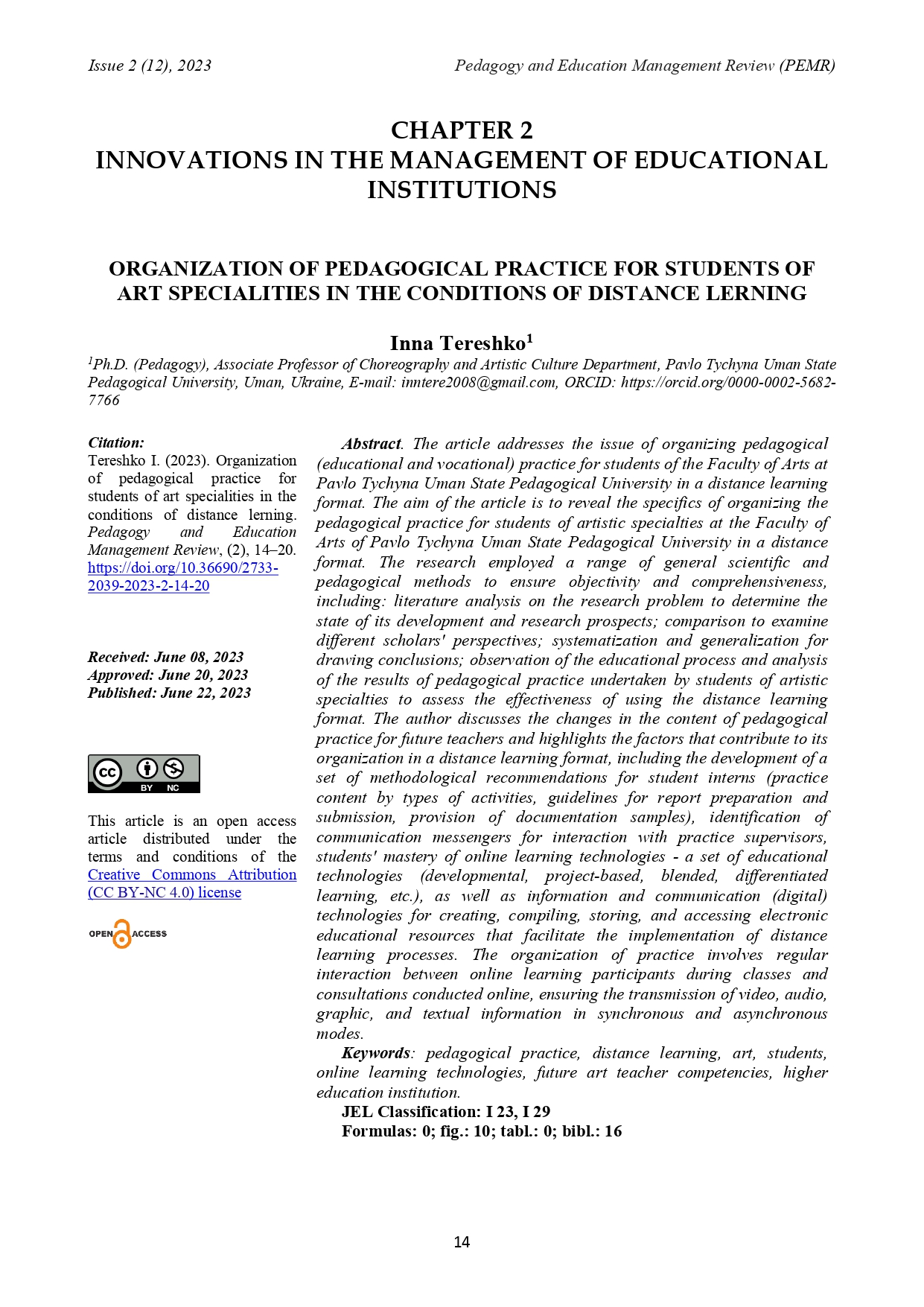ORGANIZATION OF PEDAGOGICAL PRACTICE FOR STUDENTS OF ART SPECIALITIES IN THE CONDITIONS OF DISTANCE LERNING
DOI:
https://doi.org/10.36690/2733-2039-2023-2-14-20Keywords:
pedagogical practice, distance learning, art, students, online learning technologies, future art teacher competencies, higher education institutionAbstract
The article addresses the issue of organizing pedagogical (educational and vocational) practice for students of the Faculty of Arts at Pavlo Tychyna Uman State Pedagogical University in a distance learning format. The aim of the article is to reveal the specifics of organizing the pedagogical practice for students of artistic specialties at the Faculty of Arts of Pavlo Tychyna Uman State Pedagogical University in a distance format. The research employed a range of general scientific and pedagogical methods to ensure objectivity and comprehensiveness, including: literature analysis on the research problem to determine the state of its development and research prospects; comparison to examine different scholars' perspectives; systematization and generalization for drawing conclusions; observation of the educational process and analysis of the results of pedagogical practice undertaken by students of artistic specialties to assess the effectiveness of using the distance learning format. The author discusses the changes in the content of pedagogical practice for future teachers and highlights the factors that contribute to its organization in a distance learning format, including the development of a set of methodological recommendations for student interns (practice content by types of activities, guidelines for report preparation and submission, provision of documentation samples), identification of communication messengers for interaction with practice supervisors, students' mastery of online learning technologies - a set of educational technologies (developmental, project-based, blended, differentiated learning, etc.), as well as information and communication (digital) technologies for creating, compiling, storing, and accessing electronic educational resources that facilitate the implementation of distance learning processes. The organization of practice involves regular interaction between online learning participants during classes and consultations conducted online, ensuring the transmission of video, audio, graphic, and textual information in synchronous and asynchronous modes.
Downloads
References
Androshchuk L. M. Innovations in the practical training of future dance teachers in the choreographic-pedagogical education system in Ukraine. Current Issues in Arts Education. 2019. Issue 1-2. Pp. 211-220. URL: http://nbuv.gov.ua/UJRN/apmov_2019_1-2_23
Bykov V. Yu. Models of organizational systems of open education: monograph. Kyiv: Atika, 2008. 684 p.
Blahova T. O. Professional-practical training of choreographers in the conditions of higher pedagogical education. Art and Education. 2017. No. 1. Pp. 48-52. URL: http://nbuv.gov.ua/UJRN/mtao_2017_1_12
Gorbatyuk R., Romanishena L. Experimental model of distance learning for future professionals in higher education institutions. Scientific Notes. Series: Pedagogy. 2016. No. 2. Pp. 68-75.
Gorobets T. V. Practical training of music directors in preschool educational institutions in pedagogical institutions of I-II levels of accreditation: teaching-methodological manual for students of higher educational institutions. Lutsk: Vezha-Druk, 2014. 196 p.
Zabolotsky A. Yu. The problem of the quality of distance learning. Bulletin of Dnipropetrovsk University named after Alfred Nobel. Pedagogy and Psychology. Dnipropetrovsk, 2016. No. 11. Pp. 221-224. URL: https://doi.org/10.32342/2522-4115-2016-0-11-221-224
Law of Ukraine "On Education" dated September 5, 2017, No. 2145-VIII. URL: https://zakon.rada.gov.ua/laws/show/2145-19#Text
Kukharenko V. M. Distance learning system of the university. Theory and Methods of Teaching Mathematics, Physics, Informatics. Vol. XIII (2015), Issue 3 (37). Pp. 220-233.
Martynenko O. Formation of professional competence of future dance teachers in higher educational institutions. Problems of Training the Modern Teacher. 2015. Issue 12. Pp. 165-174.
Regulations on the organization of internships at Pavlo Tychyna Uman State Pedagogical University (full-time and part-time forms of study). URL: https://udpu.edu.ua/pro-universytet/dokumenty
Rozman I. I. Distance learning: consequences and educational technologies. Scientific Innovations and Advanced Technologies. 2022 No. 1(3). Pp. 283-291. URL: https://www.researchgate.net/publication/358053108_Zurnal_Naukovi_innovacii_ta_peredovi_tehnologii_No_13_2022
Ruban I. Pedagogical practice as a means of forming subject competencies of future visual arts teachers. Problems of Training the Modern Teacher. 2017. Issue 15. Pp. 306-312. URL: http://nbuv.gov.ua/UJRN/ppsv_2017_15_39
Semenova O., Bykova O. Practical training of students in artistic disciplines: pedagogical and creative components. Youth and Market. 2021. No. 11-12. Pp. 96-100. URL: http://nbuv.gov.ua/UJRN/Mir_2021_11-12_18
Fitsula M. M. Higher School Pedagogy: textbook. Kyiv: Akademvydav, 2010. 456 p.
Allen I. Elaine, Seaman Jeff Going. The Distance: Online Education in the U.S. 2011. Babson Survey Research Group and Quahog Research Group. 40 p.
European Framework for the Digital Competence of Educators: DigCompEdu. European Commission: website. URL: https://ec.europa.eu/jrc/en/publication/eurscientific-and-technical-researchreports/european-framework-digital-competenceeducators-digcompedu







